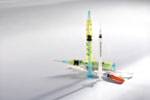 In my ongoing series on alternative remedies for type 2 diabetes, we arrive at a little-known mineral that is often overlooked. It goes by the name “vanadium.”
In my ongoing series on alternative remedies for type 2 diabetes, we arrive at a little-known mineral that is often overlooked. It goes by the name “vanadium.”
Here’s a quick introduction. Vanadium acts like insulin by increasing glucose uptake by cells and also reduces insulin resistance. Both of these actions are of great benefit to a diabetic. Vanadium is a chemical element that comes in food and the best sources include: grain; artificially sweetened drinks; mushrooms; wine/beer; dill weed; parsley; black pepper; shellfish.
I have identified five studies that illustrate an effect either on HbA1C and/or fasting blood glucose by vanadium. Lowering both are positive signs. (HbA1C is a form of hemoglobin that reflects the average blood glucose levels over the past 90 days.)
1. In one, vanadium dropped HbA1C percentages from 8.1% to 7.6%. It dropped fasting blood glucose levels from 10.8 to 8.6 millimoles per liter (mmol/L).
2. In another study five years earlier, vanadium dropped HbA1C from 9.4% to 8.8% and fasting blood glucose levels from 12.3 to 10.6 mmol/L.
3. In another, 150 milligrams (mg) of vanadium dropped HbA1C from 7.8% to 6.8%, while 300 mg dropped it 7.1% to 6.8%. The 300-mg dose dropped fasting blood glucose levels from 9.3 to 7.4 mmol/L.
4. In another study, vanadium dropped HbA1C from 9.6% to 8.8% and fasting blood glucose levels from 11.7 to 10 mmol/L.
5. Another saw vanadium drop HbA1C from 9.3% to 7.4%.
The average decrease after vanadium supplementation was 0.64%.
A meta-analysis on the effect of vanadium supplements for type 2 diabetes had this conclusion: “There is no rigorous evidence that oral vanadium supplementation improves glycemic control in type 2 diabetes. The routine use of vanadium for this purpose cannot be recommended. A large-scale randomized controlled trial is needed to address this clinical question.”
Our daily nutritional requirement for vanadium is in the range of 10-30 micrograms, which is adequately provided by the diet. The safety of the much higher dosages used in clinical studies is questionable. The most common adverse effects of supplementation include: bloating; nausea and vomiting; diarrhea; and stomach pain. Toxic effects might be seen in the liver, kidney, reproductive organs, or in an unborn baby. Don’t attempt to supplement with vanadium without the supervision of your doctor.
Here are the previous articles in this series:
An Inside Look at Diabetes
How Effective Are Drugs for Diabetes?
The Ultimate Mineral for Diabetes
Should You Take Cinnamon for Diabetes?
How to Fight Diabetes with Fiber
Can Magnesium Fight Diabetes?
